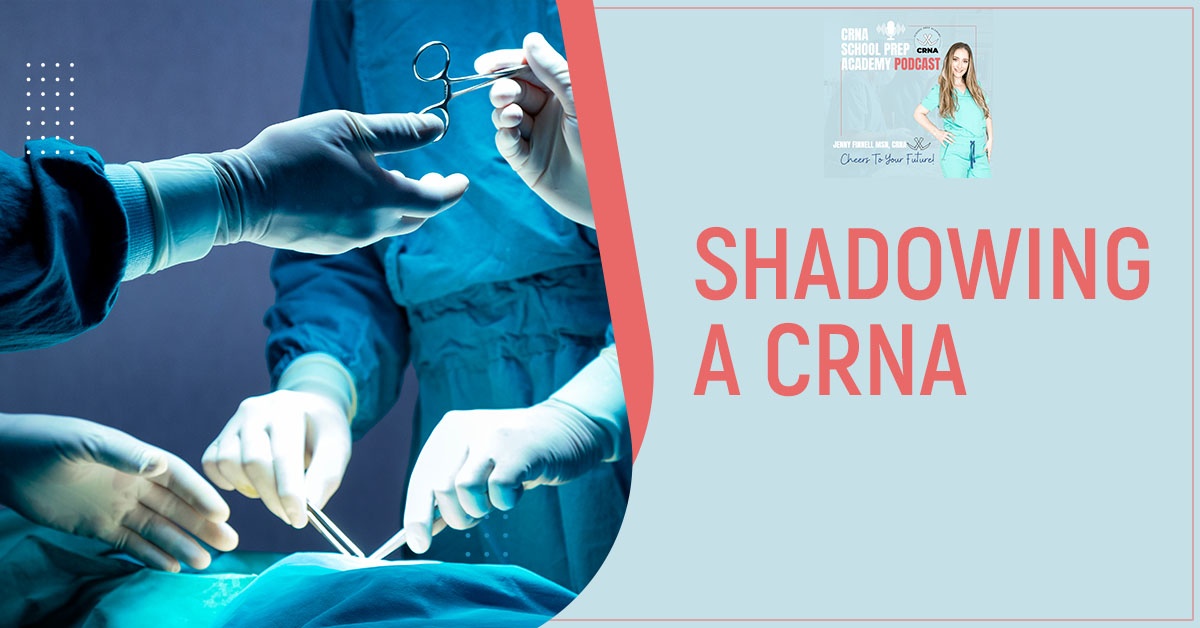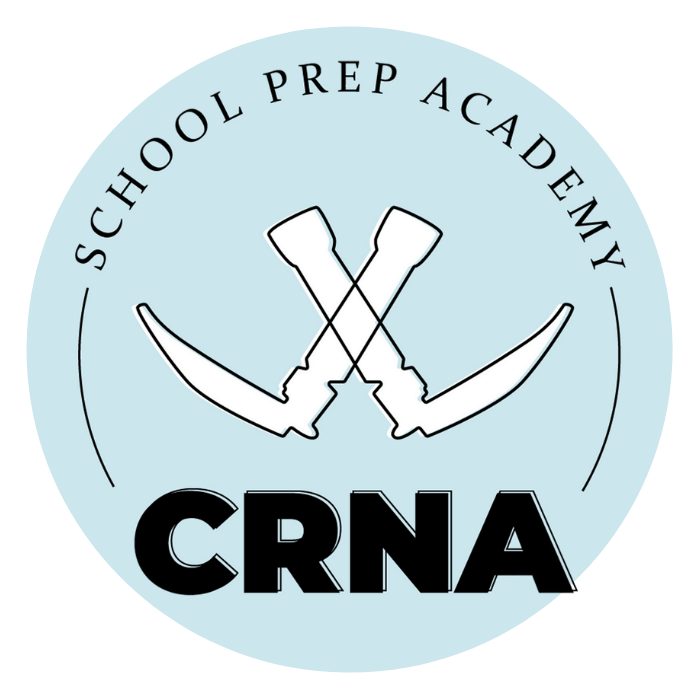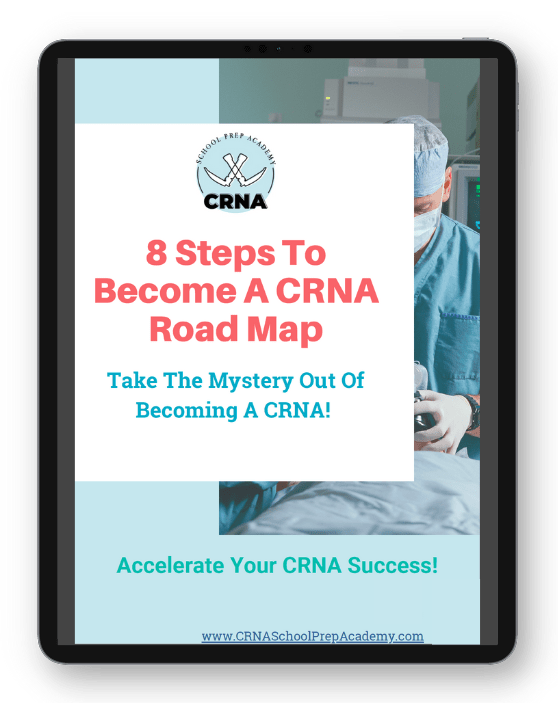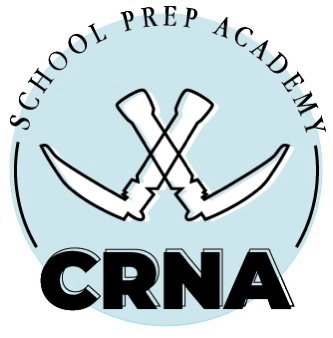
If you’re wondering when the best time to start shadowing a CRNA is- look no further! With COVID on the decline and hospitals opening back up to in-person experience, you’ve got the opportunity to be proactive in creating the career of your dreams.
In today’s episode, we dive into:
Why it is crucial that you get started shadowing as soon as you decide you’re interested in the CRNA career path
When to get started seeking out shadowing opportunities
How and who to ask about shadowing a CRNA
The benefits of building your network
How to get the most out of your shadowing experience once you’re on the inside
Happy shadowing, future CRNA!
Grab your FREE shadow documentation form here!
https://www.cspaedu.com/j814jsxq
Get access to planning tools, valuable CRNA Faculty guidance & mapped out courses that have been proven to accelerate your CRNA success! Become a member of CRNA School Prep Academy here:
https://www.crnaschoolprepacademy.com/join
Book a mock interview, resume edit or personal statement critique:
Join the CSPA email list: https://www.cspaedu.com/podcast-email
Send Jenny an email or make a podcast request!
Hello@CRNASchoolPrepAcademy.com
Join us at the CRNA School Prep Academy Conference!
https://events.crnaschoolprepacademy.com/
—
Watch the episode here
Listen to the podcast here
Shadowing A CRNA
I have always had a passion for helping those who aspire to become a CRNA. A couple of years ago, I started mentoring a handful of prospective students. Fast forward to now, I have a successful mentoring program that has impacted hundreds of aspiring and now current nurse anesthesia students. What I enjoy the most in my business is connecting with you, the future CRNAs. I love learning and growing with you. The road to CRNA is full of unique challenges and no two journeys are the same, but every journey has a learning opportunity.
I’m here to share what I have learned over the years, not just with my students, but with the CRNA community leaders and program faculty from my time as a practicing CRNA. This will be your one-stop shop to get the mentor you need to not only guide you into this career path but support you all the way through to graduation day. If you’re a nursing student, who’s exploring the possibility , an ICU nurse actively pursuing CRNA or a current nurse anesthesia student, you’re in the right place. Tune in for inspiration and actionable takeaways that will help you from start to finish. Let’s get started.
—
Welcome back to another episode of the show. There’s been a lot of changes in my world as of late. We had our third child. In this episode, we are going to talk about shadowing.
I’ve seen a lot of questions about shadowing experiences because things are starting to lighten up a little bit. The Corona is dissipating. A lot of facilities are opening back up the doors for shadowing opportunities. I wanted to make this episode somewhat timely and I want you guys to make sure you’re seeking out this opportunity early and often. A lot of schools say shadowing is recommended. Some will say it’s required, but back to this whole recommended and required.
I hope you know by now, if you’ve been following me, that if it says it’s recommended, just in your mind say, “That’s required,” because any recommendations to be competitive are going to be required. Not to mention, you don’t want to enter a career path before you’ve done your due diligence and research on it because that could be a very expensive and overall stressful mistake to make. Can you imagine starting anesthesia school, spending tens of thousands of dollars and starting clinical only to realize, “This is not what I thought it was? I don’t like this. I can’t picture myself being a CRNA anymore.”
Unfortunately, I have heard of that happening. That’s also why these schools like to see that you have shadowed because it gives them reassurance that it won’t happen to you. This means you’re not going to be that student who decides to leave because all of a sudden, CRNA is not what you thought it was. You don’t want to put yourself in that position. Please, if you choose this career path, you need to make sure you’re at least job shadowing a handful of times, ideally, but at least once to make sure that this is for sure something you could picture yourself in.
What I will tell you from my shadow and experience back in the day, it lit the fire under me. It gave me that excitement and that encouragement I needed to push through and keep going. I probably haven’t shared it with you often, but I was pretty depressed in the ICU. I did not like my time in ICU. I loved the nurses I worked with and the ICU knowledge and critical care, but I dealt with a lot of clinical depression because I was around so much death and suffering.
I had a really hard time coping with that as an ICU nurse and still, to this day, I can’t watch scary movies. Scary movies, but torture and death, no. I don’t like death. I don’t like watching someone get hurt. It physically makes me sick. I had a hard time in the ICU, to say the least. I shed a lot of tears, that’s for sure.
Shadowing is something that I think will also help you keep that fire and that momentum to keep pushing you forward. It’s not about saying that this is the right career path for you. It’s also about keeping that motivation to push through because applying to CRNA school and getting accepted to CRNA school is hard. I know you know that because you’re here. I know you need guidance and support.
Getting that shadow experience will reignite the passion you have to pursue this career path. That’s another benefit of doing this. When I say to do it frequently and early on in nursing school, why not? Do it in nursing school. If you’re already a nurse’s aide, it means you already have access to the medical world. There’s nothing wrong with going down to the surgical or the anesthesia department and saying, “I’m a nursing student. I work here as a nurse’s aide. I would love to spend some time with the CRNAs because I’m interested in potentially pursuing this in the future.”
That’s all you have to do. You don’t have to get permission from anyone to go do it besides seeking it out yourself. Call the operator. Ask for the anesthesia department and try to set up a time again. You don’t have to already be a nurse to gain shadow experience. It’s the desire to want to see and learn more. Me, I was a nursing student and I knew critical care was something I was interested in because I liked critical care knowledge. I loved pharmacology. I love pathophysiology.
Shadowing will help you find that fire and momentum to keep pushing forward. Click To TweetMost nursing students have heard of CRNA and I had heard of CRNA, but I didn’t think I could do CRNA. I thought it was way above me. I thought I wasn’t smart enough and capable, but I was interested. I had an opportunity to rotate in the ICU as a senior nursing student and I let them know that I wanted that opportunity to do that. I was fortunate and lucky enough to be selected to get a rotation in the ICU as a nursing student.
It happened to be in the surgical ICU. I was getting a report from a CRNA and we would routinely get reports from CRNAs. I went up to them and I used my best judgment that it wasn’t a critical point in getting a report. I went up to them and said, “I would love to shadow you someday if that’s a possibility because I’m considering CRNA. I’m still in nursing school. Is there a contact I can get that would help me to be able to do that?” It was no problem. They were excited to help me.
My First Shadowing
I had my first shadowing in the operating room as a nursing student to see a CRNA. It was from that moment on that I was like, “100%, this is for me. This is so stinking cool. I can’t wait to know that knowledge and be able to do those things.” From that day forward, I made a point to get into the ICU as a nurse’s aide. I took all the necessary steps from that day forward to make sure CRNA was something that I could work towards.
I went on to shadow at least three other times. I think I had a total of 4 or 5. I can think of four, I thought I had five, but either way, I don’t remember documenting all of my shadowing experiences. I only documented a couple and that was for my application. That was probably a mistake. I should’ve documented them all. I do have a documentation tool for you to use, even if it’s early on, because I think it’s helpful to jog your memory and it never hurts to have proof.
Some of these schools only say, “Recommended.” They don’t require you to have proof of your shadowing experience, but you should. You can submit it as additional documentation in your application process. Even if they have their own form to fill out for shadowing, it never hurts to submit additional documentation from your shadow experience as a nursing student or early on prior to even knowing they had a shadow form because it shows, “Not only did they say they shadowed a handful of times or five or six times, they have proof that they did.”
It’s going to show how bad you want the career path. What you’ll see is it’s mostly just checkmarks and you get the signature of your CRNA. I encourage you on the back of that paper or I would encourage you to probably type it up. When you go home after your shadowing experience, type up what you learned that day because you’ll forget, especially if it’s years away from your application process. I think it’s cool, too, to compare your first shadowing experience to your last shadowing experience to see, “Look how much I’ve learned over my period of time and look how much more understanding I have of the career path from my first shadowing experience to my last shadowing experience.”
I encourage you to summarize your experience and what you learned from the CRNA that day. Type it out, summarize it and have it be a part of your actual form. That could be on a separate piece of paper. The shadow form that you’ll download is mostly just a checkbox and the CRNAs signature to prove that you did it. Having a second piece of paper that’s a summary of your day is a good thing to have. Start as a nursing student. Start as an ICU nurse. Whenever you decide CRNA is what you think you want to do, that is the moment that you should start your shadowing experience.
How To Get The Experience
A lot of people come to me and they ask me and they’re like, “Jenny, how do I get this experience?” Especially with COVID, it made things extremely difficult. A lot of hospitals were not allowing anyone extra in the OR and again, they’re starting to lighten up on that a little bit. The best way is to call the anesthesia department at a hospital you currently work at or as a nursing student and let them know that you’re interested. Again, that could be calling the operator and asking for the anesthesia department.
I’ve had nurses ask me if they should ask their nurse manager. No, I would not do that. You don’t need anyone’s permission to shadow. You don’t and not to mention, especially if you’re brand new in the ICU, the last thing you want to do is say, “I just started, but I want to shadow a CRNA.” I’m trying to give you guys some advice. You don’t want them to hear you saying, “I’m new here, but I want to leave as soon as possible.” That’s the way it looks to them. Remember, you have to ask for references from them. Use your best judgment on whether your nurse manager will be cool knowing that you want to pursue CRNA. The vast majority of people keep that a little bit of a secret until they’re closer to applying to school.

You don’t need permission from your nurse manager to job shadow. Reach out to the anesthesia department and let them know that you’re interested. If you get a report from a CRNA, get their number. Let them know you’re interested. That’s all you have to do. My advice is to start by where you work because that’s usually how you’re going to be able to get into the operating room.
A lot of hospitals don’t like outsiders because there’s a lot of paperwork to fill out. There are a lot of HIPAA compliance things. It’s easier to try to seek out opportunities where you currently work as a nurse or where you currently rotate as a nursing student. Keep that in mind. If you’re a nursing student, you can ask your clinical instructor. Go up to one of your educators that you know, like and trust and say, “I’m interested in this career path. Is there any way you can help me gain a shadowing experience as a nursing student?”
That’s my advice on how to get an experience, but don’t be afraid to step out of your comfort zone and travel for this experience. I’ve known nurses who have gone out of state to get this experience. That stinks and I hope that’s not what you have to do, but that’s how important it is to make sure you’re getting this experience even if you have to travel to do that and trying to network as much as you can.
—
I wanted to come on here to thank you guys for being loyal followers. I appreciate you and everything, joining me here. It means a lot to me and I enjoy so much helping you along your CRNA journey. I wanted to remind you guys, if you have not checked out CRNASchoolPrepAcademy.com, to go ahead and see what that’s all about. We would love to mentor you inside the academy and for current students, heck yeah, high-five, a big shout out to you. We appreciate you. We love all of you guys and it’s so exciting to see you grow along this journey. If you’re looking for more personalized guidance along your CRNA journey, it doesn’t really matter where you are. We have people who are still in nursing school.
I will say this about the nursing school, though. I do think that the ideal time to join while in nursing school is probably towards the end of it. Probably as the senior nursing school and from there on. You can be an ICU nurse for six years. You could have just started your ICU journey. CRNA School Prep Academy will give you that one-on-one mentoring, that guidance that you need to tackle your goals without hitting any roadblocks.
I think the sooner you start investigating this career path, taking it on and jumping all-in, the better you’re going to be and the more prepared you’re going to be. We do educational workshops and live Q&A sessions every single month. Again, those are things that are going to help propel you guys towards your goal and allow you guys to miss the barriers and the obstacles that may stand in your way and while getting the guidance you’re seeking. Again, check out CRNASchoolPrepAcademy.com for more information. We hope to see you guys there. Now, let’s get into the show.
—
One way to network and get these experiences is to go to open houses, get to know the program director and other current CRNAs, touch base with them and see who they know. That’s always a way to do it is to try to network within the community and try to say, “How did you get your shadowing experience? Who did you talk to? Do you have their number? Can I reach out to them?” Be persistent. Persistence is key. You don’t want to give up after not getting through to one place. If one place said, “No,” keep trying new places.
Show up at their desk and say, “I’m here. You’re not going to call me on the phone anymore. I’m here to shadow. Set me up with an experience.” I’ve had people who are persistent and if they got a bunch of no’s on the phone, they would start showing up in the anesthesia office and saying, “I’m a nurse. I want to pursue CRNA. I need a shadowing experience so I can apply it to school. Can you please help me?” That’s all you have to do. There’s nothing wrong with asking and don’t be afraid to ask.
Recommended Versus Required
Back to the recommended versus required- if you can’t find someone to shadow, if you’ve tried and tried and you’re like, “I can’t do it. My application is due and I need a shadowing. I can’t get a shadowing experience.” Reach out to your program and seek their guidance. A lot of programs are allowing a virtual experience. What I mean by that is simply talking to a current CRNA about the profession. I have a virtual shadowing experience I did at CRNA School Prep Academy for my students. It is for three hours.
Don't be afraid to step out of your comfort zone and travel for the experience. Click To TweetI try to jam-pack everything in there. I try to talk about pre-op, induction, maintenance and emergence. I even did a virtual anesthesia machine check with Drager’s online virtual machine check. I encourage you to check out that website and try to explain things. I try to make it as thorough as possible. In that way, my students are not held back by that requirement. A lot of programs have been very accepting of that. However, I’m going to preference that with, “They still prefer an in-person experience.”
Virtual is not the same as in-person. It never will be. It never can be. Even if you’ve gained a virtual experience with a CRNA or with CRNA School Prep Academy, I still encourage you to seek out that in-person experience because there’s nothing that can replace it. There’s nothing that can give you more insight into what your day would be like as a CRNA than seeing it happen.
Know that the schools that are lenient and that will allow a virtual experience; they still prefer an in-person experience, so don’t give up or don’t think, “I’ll get a virtual one and I won’t even try for an in-person one because I don’t think I can.” You never know until you try. I’m going to end that little rant right now, but just so you guys know.
Why is it important? It’s because you want to make sure you’re investing in your future. You’re putting a lot of time and effort into school. You want to make sure it’s what you want to do. I went over the benefits already as far as it’ll fuel your passion for wanting to pursue this career path and it will get a lot of your questions answered. It allows you to network.
Asking Questions
I could go on and on. There are a lot of benefits of shadowing. Another question I get from my students is, “I’m nervous to shadow. What do I ask? What if I say something stupid?” It’s all those fears of being in an unfamiliar environment. I get it. The vast majority of students that I see that come and shadow are very quiet and you can tell they’re scared. Don’t be afraid to ask your CRNA questions. Be mindful of when you ask those questions and be cognizant of what’s going on. It means if they’re in the middle of induction or something going on, a case that needs their attention, don’t bombard them with questions during that moment. Take a lunch break with them and then ask them all your questions during their lunch break or during their morning break.
If you have a longer case and the CRNA now is sitting down and in the maintenance phase of anesthesia. A lot of times, they may prompt you and say, “What questions do you have?” They may prompt you when a good time is to ask them questions. Not everyone is going to be that friendly, but hopefully or maybe they won’t even know you’re interested. I’ve also had students who I actually think they’re in the operating room to shadow the nurses, not me. The OR nurses and not the CRNA. Sometimes I don’t even know that they want to know more about being a CRNA because they’re a nursing student and they’re there because they’re trying to see the OR nurses, but maybe they’re interested in CRNAs.
Don’t be afraid to come up to your CRNA and ask questions and say, “This is something I’m interested in,” because then they’ll be more likely to say, “You are? Cool. Let’s chat,” and then maybe get their email or their phone number. Don’t be afraid. As far as what types of questions, I think the important questions to ask are, “What do you see as the pros and cons of your job? Do you like your job? What do you dislike about what you do? What’s your favorite anesthesia case to do and why?”
Essentially, bring in a notepad and take notes. What drugs were they pushing? Why did they tape the eyes prior to doing a DL, a direct laryngoscopy? Learning some of the terms that they use and jotting those down. You don’t always have to ask why at the moment, but jot them down and when you have time to chat, ask them. “Why don’t you tape the eyes prior to doing your intubation? They can tell you, “Because corneal abrasions are a risk.”
They can go over the rationales behind why they chose to induce with ketamine versus fentanyl or whatever they’re doing that’s a little bit different in the case. They can go over that with you. Maybe ask them about ventilator settings. Let’s say, “Why did you choose this ventilator setting over something else?” You can ask them about where they went to school and how school was for them. What did they find to be the most challenging part about school?

Being More Personable
There are all kinds of stuff. Be friendly. Be who you are. Maybe tell them a little bit about why you’re pursuing CRNA. They may want to get to know you a little bit. When you get more personable with the CRNAs- this is also why I think doing the shadowing is beneficial, especially if you stick with the same CRNA and do it more than once- because they could become great letters of reference for you. Especially if they take the time to get to know you and know why you’re pursuing CRNA, they can become one of your allies and help you during the application process.
They can become your own personal mentor. I think it’s worthwhile to try to be friendly and try to get to know them in the sense that you can come back and shadow them again. As I said, they can become a good reference for you down the road. I’ve had some people ask me whether they can ask for a reference from a CRNA they shadowed once. I think you can and a lot of CRNAs definitely will do that, but keep in mind, if they don’t know you or take time to get to know you during that one day, they might have to put N/A for a lot of the qualifications.
Most of the time these days, the reference letters are automated and they list these characteristics. You’re given a scoring system and you’re also given, “Not applicable.” If they never took the time to talk to you, but you sat there really quietly and shadowed them for the day, they’re going to probably have to put a bunch of not applicable because they don’t know you.
It’s okay to ask for a reference from a CRNA you shadowed once, but make sure you’re taking the initiative to get to know them, get their email, get their number and get to know them a little bit. Maybe give them your resume or your essay for school or something like that to that they can get to know you a little bit to make sure your reference is a better reference and not a bunch of not applicable checks.
They may give you excellent all across the board because they’re giving you the benefit of the doubt, but some people may not feel comfortable doing that if they really truly don’t know you. It’s something to be aware of when you’re asking for shadowing experiences for references. That sums up what I was going to go over with you in this episode. If you guys haven’t heard yet, and again, depending on when you read this, I know it could be way after the fact because sometimes I know me, I like to go through shows that I love and binge-read everything.
As a quick reminder, CRNA School Prep Academy has a conference coming up. We are so excited to meet you guys. There is so much opportunity and growth that you’re going to walk away with from this conference. Richard and I are so excited. If you want to learn more, head over to Events.CRNASchoolPrepAcademy.com to learn more about this great event. I hope you guys have a good rest of your day and we’ll see you next time.
—
Future CRNA, as always, I appreciate you and your loyalty. Thank you so much for tuning in. I’d love to hear from you, so screenshot this episode and share it through your IG stories with your biggest takeaway. Don’t forget to include the #CRNASchoolPrepAcademy. Stay strong and I’ll see you in the next episode.
Important Link
Get access to planning tools, valuable CRNA Faculty guidance & mapped out courses that have been proven to accelerate your CRNA success! Become a member of CRNA School Prep Academy here:
https://www.crnaschoolprepacademy.com/join
Book a mock interview, resume edit or personal statement critique:
Join the CSPA email list: https://www.cspaedu.com/podcast-email
Send Jenny an email or make a podcast request!
Hello@CRNASchoolPrepAcademy.com
Join us at the CRNA School Prep Academy Conference!


